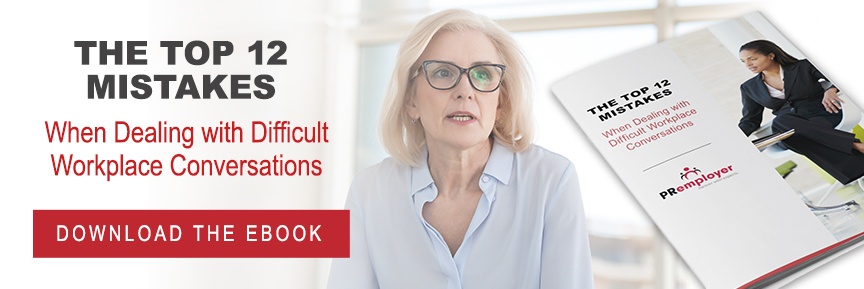
The New Year can mean that a lot of new positions need to be filled, and a lot of new employees will be brought on board. Small employer mistakes in paperwork can lead to significant problems later on. As positions are advertised and filled, it is crucial to keep these common HR mistakes in mind to avoid those problems down the road.
- You are neglecting to update compliance with changed or new regulations. For instance, expanding business locations into different states can often correspond to the addition of new rules and laws.
- You have an incomplete or outdated employee handbook. As one of the essential documents employees will read and refer back to, the policies and procedures in the employee handbook should clearly describe the organization's current expectations.
- You give unstructured salary increases. One of the more common employer mistakes is unstructured salary increases. Without knowing why they are rewarded, employees must guess what they have to accomplish or what standards they have to meet to get periodic raises.
- You are not keeping good records. This can lead to payroll problems, such as overpayments and underpayments. Making payroll mistakes can cause employees to lose confidence in an employer and may even subject companies to investigations by the department of labor.
- You are sharing confidential information. Another critical mistake is unintentionally or intentionally sharing an employee's private information without consent. This can include medical information that not only results in frustration and hurt feelings but violates government regulations such as HIPAA.
- Miscalculation of overtime payments. This is one of many common HR mistakes that leads to employees losing confidence in their employers. It can also cause employees to put forth less effort on the job.
- You are not implementing compliance training programs. As organizations expand, it is critical that employees are aware of existing regulations and how their roles fit into ensuring organizations uphold their workplace cultures.
- You make legally binding promises without documentation. A verbal statement may be difficult to prove or uphold. For instance, promising an employee a specific raise without documenting the amount and effective date of that raise can lead to HR mistakes.
- You do not implement the proper channels for complaints. Do employees have anonymous methods of filing complaints against co-workers, superiors, and the organization in general? If employees do not feel safe or do not have proper methods for filing complaints, it can cost an organization in turnover, government fines, and disengaged employees.
- Give employees the false impression that electronic communications are private. If employees' electronic communications and computer activities are being monitored or are subject to monitoring, the organization should state this in a policy or their employee handbook.
- You hire unpaid interns. This can lead to violations of the U.S. Department of Labor's Fair Labor Standards Act. While not all unpaid internships constitute violations, it is important for organizations to check the Act's stipulations to ensure compliance.
- Your disciplinary process is undocumented. Employees should be aware of what constitutes discipline, what various steps and consequences are involved, and what they can do to help turn around their performance. Without a documented and fair process, it is more likely that an employee will be able to sue an organization for unfair treatment and wrongful termination.
- You are not developing an employee persona for each position. If organizations do not know what is needed to succeed in a position, HR departments and hiring managers will have a difficult time attracting and securing the "right" talent for the job.
- You offer non-competitive health benefits. Although adequate salaries are a critical part of attracting the "right" talent, so are excellent health benefits. Not offering comprehensive insurance or plans that cost too much will repel potential recruits from an organization and increase turnover.
- You rely solely on interviews for hiring decisions. HR departments and hiring managers should consider referrals, recommendations, the candidate's performance on screening tests, prior work, education, and experience as part of the decision-making process.
- You complete payroll too late. Running payroll too late means employees don't get paid on time. This leads to increased turnover and violations of the Fair Labor Standards Act.
- Ineffective onboarding. Not having a thorough onboarding process in place means employees aren't ready to perform their jobs well. This can make them feel isolated, unsure of what is expected of them, and unaware of how the organization's culture operates.
- Inaccurate job descriptions. HR departments and hiring managers need to ensure job descriptions are accurate and complete. This helps employees and candidates know what the organization expects and how their roles fit in with the organization's overall mission. Remove tasks that are no longer relevant and add in those that may be missing. Ensure that the duties are appealing to the ideal candidate.
- You hire independent contractors that do not meet the legal definition. This violates the Fair Labor Standards Act. Ensure positions that require the hiring of employees are classified correctly and that any positions filled with independent contractors comply with the Act's stipulations. Additionally, don't misclassify employees as "Exempt" under the Fair Labor Standards Act when such employees do not meet the "duties test" as set forth in the regulations. This can lead to significant penalties, to include paying unpaid overtime, interest penalties, and other back pay awards.
- You fall behind on payroll taxes. Not keeping up with payroll taxes means that the organization isn't fulfilling its basic obligations to the government. Late payments can increase an organization's cost in terms of penalties and interest.
While this is a lot to keep track of, HR needs to ensure obligations are met, and expectations are clear. When an employer fails to meet its obligations, it not only incurs increased short-term costs but can lead to difficulties attracting and retaining qualified staff. This can lead to problems with long-term sustainability. To help ensure compliance and obligations are met, organizations can partner with regulatory experts who can handle the bulk of the administrative burdens.

